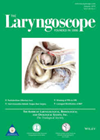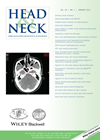
Journal Reviews
Narrow band imaging in the management of carcinoma of unknown primary
This was a retrospective study to assess the utility of narrow band imaging (NBI) in the detection of a primary site in carcinoma of unknown primary (CUP). Patients with CUP who underwent transoral robotic surgery (TORS) and preoperative imaging with...
Preventing major postoperative haemorrhage following TORS
Transoral robotic surgery (TORS) has become an increasingly utilised treatment modality in the management of oropharyngeal squamous cell carcinoma (OPSCC). Postoperative haemorrhage, although uncommon, is a significant complication. To ameliorate this risk, transcervical ligation of branches of the external carotid...
Which da Vinci surgical system? Novel flexible, single-port versus current multiport, rigid-arm robotic surgical system
The da Vinci robotic surgical system has transformed how oropharyngeal head and neck surgery can be delivered. The existing da Vinci Si model has challenges: the dimensions of this are larger than would be ideal for head and neck surgery...
The newest robot from da Vinci – what can it offer for hypopharyngeal cancer surgery?
The standard existing da Vinci surgical robot (the Si model) has been much maligned for not being optimally designed for transoral access and endoscopic manoeuvrability in head and neck surgery. This preclinical work from Holsinger and his team looks at...
What is the evidence for contralateral tonsillectomy in TORS for known unilateral tonsil malignancy?
The concept of field changes by carcinogens within the upper aerodigestive tract is well established with reported rates of synchronous tumours of 4% and second primaries of 36%. The tonsil in particular has the highest rate of synchronous tumours, postulated...
Risk factors for TORS treatment failure in HPV-related oropharyngeal cancers
HPV-related squamous cell cancers are an increasingly common cause of malignancy in the oropharynx. There is evidence that these cancers are associated with a significantly improved overall survival compared to conventional HPV-negative tumours. The optimal treatment for such cancers is...











